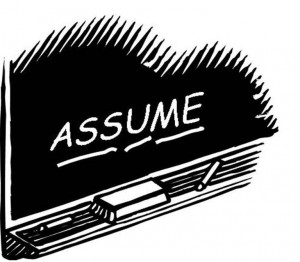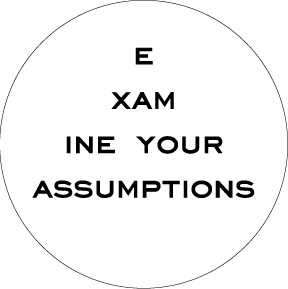 So I was giving a talk at my old junior college, encouraging final-year seniors to apply to an overseas college like Penn. After the talk, a student came up to me and asked how he could afford the tuition fees for an expensive US education.
So I was giving a talk at my old junior college, encouraging final-year seniors to apply to an overseas college like Penn. After the talk, a student came up to me and asked how he could afford the tuition fees for an expensive US education.
“Well,” I said, “Maybe you could apply for a scholarship?” He just stared at me like I just said the most ridiculous thing in the world, like “Hey, maybe you could rob a couple of old ladies?”
He backed away slowly and muttered, “No, I don’t think so.” And I was like, “Why?” And he said, “I don’t think I could ever qualify for a scholarship.” And then he left.
Here was someone who was presented with an opportunity to get hundreds of thousands of dollars in funding, and then subsequently disqualified himself from it. All because he just assumed that he wasn’t a “scholarship kind of guy”.
How many of us hold certain assumptions that are so deeply-entrenched that we’d never think of challenging them? Think about some of the conventional beliefs that so many of us have today:
- Everyone should get a college degree
- The MRT is more reliable than the bus
- A diamond ring is a good investment
- There is only one perfect person for everyone
- McDonald’s only serves breakfast till 11am*
- Investing in real estate is a good idea for everyone
- I could never ask my boss for a raise
- All online courses are scams
- To be successful, I need to have a job, a house, a car, and 2.5 kids
- Renting is just throwing money away
* In Singapore, it serves breakfast till noon on weekends. You can thank me later.
These assumptions are so amazingly powerful that they can influence our lives. Think about decisions like “I could never afford to study overseas, so I won’t even bother to apply.” Or “It’s good to get a 30-year mortgage, because everyone is doing it.” These are important decisions. Serious decisions. Change-your-life-forever decisions.
Yet, it’s pretty scary how we let our assumptions influence our decisions without questioning and testing them first.
I can think of one assumption that could mean the difference between retiring 10-20 years earlier, or busting your ass in a job you hate until you’re old and frail.
The assumption: “Investing in stocks will never work for me.”
You’d be surprised at just how many of us Gen Yers hold this assumption. According to a Wells Fargo survey, twenty-somethings are the least confident among all age groups that stocks are the best place for investment gains. They’re also the most likely to choose a bank CD over stocks for retirement savings.
Sure, keeping your money in bank CDs is a brilliant strategy – if your idea of retirement is clipping NTUC coupons to save 20 cents on toilet paper.
As I’ve argued before, keeping everything in a safe cash account is almost definitely a bad idea. If you’re a young, sexy, twenty-something, investing is probably the only way to prevent inflation from screwing you over.
So… why aren’t your friends investing yet?
It’s because most of them have deep-seated assumptions, which prevent them from even thinking about investing in stocks. Some of them are:
- I don’t know how to pick stocks
- I don’t have time to invest
- I’m not rich enough to invest
- Investing is way too confusing
Whenever I hear assumptions like these, I just sigh. It’s much easier to come up with excuses on why you shouldn’t do something, instead of taking the time to actually test those assumptions out. It’s like an overweight person claiming that he’s just “big-boned”, or an unemployed person blaming “the economy”.
Let’s test those assumptions out, shall we?
“I don’t know how to pick stocks”
A lot of people don’t know this, but investing isn’t about picking stocks. Why bother to pick specific stocks when you can buy the whole stock market, which has beaten out the vast majority of professional money managers in the long run?
Wikipedia states that more than 90% of a portfolio’s performance comes from your asset allocation. That means that it doesn’t matter which individual stocks you pick, but how much money you allocate to stocks as a group.
And yeah, I just quoted Wikipedia. It’s more reliable than your money manager.
“I don’t have time to invest”
Most people assume that if they start investing, they’ll need to constantly read the Wall Street Journal, tune in to CNBC, and stare at squiggly stock charts on their phones. (Whenever I see anyone on a subway studying a complicated chart on their phones, I have this irresistible urge to tap them on the shoulder and go, “If you stare at it hard enough, it kind of looks like a unicorn!”)
It probably stems from the assumption that if it’s important, it must take up a lot of time.
Not true. I check my portfolio once a month at most, spending no longer than one hour each time. Then I close my browser, and move on to other awesome things like blogging for cheerfulegg and watching Jurassic Park in 3D (HOW COOL IS THAT?!).
“I’m not rich enough to invest”
When you mention the word “investor”, the first thing that most people think of is some old white-haired dude hobbling around in his mansion holding his cane and a gin and tonic.
That’s probably why most people believe they’ll need tens of thousands of dollars stashed up before they start investing. While it’s good to have a small emergency fund saved up first, you really don’t need to wait till you’re swimming in a pool full of cash with two scantily-clad ladies fanning you with banana leaves before you start investing.
You could literally start your portfolio by investing in just ONE share of a stock market ETF for less than US$50, and build it up from there. Check out the ETFs from Vanguard for starters.
In fact, it’s in your interest to start investing as soon as possible, even if it’s just a tiny amount. The longer you spend invested in the stock market, the higher your chances of coming out on top and the lower your risk. And then you can start to think about hiring your own scantily-clad ladies.
“Investing is way too confusing”
I often get emails from people who say they don’t know what to do with the extra money in their bank account. They’ll then get into a detailed technical discussion about “yield” and “volatility”, before complaining that everything is way too confusing.
Dude, chill. It’s not as complicated as you think. All the information you’ll ever need is right in front of you. Most of it is free.
Look – No one is asking you to figure out the difference between a municipal bond and a corporate bond here. Just take 3 hours and read one good personal finance book to understand some basic investing principles. Start with any book from the “Personal Finance” category under my Reads page. You’ll realize that investing is actually really simple. Really.
You know what else is free? Information right here on cheerfulegg. I spend countless hours writing new material on investing, and people STILL ask what they should do with the extra money in their bank account. It makes me want to smear sambal chili all over myself and roll all over a nest of fire ants.
The Takeaway:
Start testing your assumptions to see if they’re valid. If you don’t, you’ll get screwed, especially when it comes to important life decisions like investing. If your friends haven’t started investing yet, ask them about their assumptions. Are they valid reasons, or simply excuses?
Agree / disagree with the above assumptions? Are there any others that I missed out? Leave me a comment to let me know what you think. I read every one.


[…] Like I’ve argued before, it’s way easier to come up with reasons on why we don’t want to change our habits, rather than truly test our assumptions out: […]